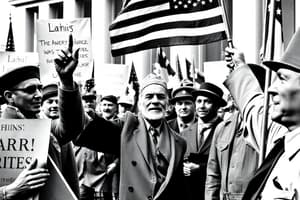Podcast
Questions and Answers
What is the primary focus of social history?
What is the primary focus of social history?
- The political events of a society
- Economic developments and trends
- Cultural, social, and gender experiences (correct)
- Technological advancements in history
Which theme explores how structures and roles within families have changed over time?
Which theme explores how structures and roles within families have changed over time?
- Family and Kinship (correct)
- Culture and Identity
- Social Movements
- Social Change
How do technological advancements relate to social history?
How do technological advancements relate to social history?
- They have no impact on social structures.
- They affect social structures and daily routines. (correct)
- They only influence economic factors.
- They solely change political regimes.
What is an example of a primary source in social history research?
What is an example of a primary source in social history research?
Which theme focuses on the impact of social reform and protests?
Which theme focuses on the impact of social reform and protests?
What does the study of 'Everyday Life' in social history include?
What does the study of 'Everyday Life' in social history include?
What role do social institutions play in social history?
What role do social institutions play in social history?
What is a common method used in social history to analyze societal trends?
What is a common method used in social history to analyze societal trends?
Flashcards
Social History
Social History
The study of how societies function and change over time, focusing on everyday people and their experiences, differentiating from political or economic history by emphasizing cultural, social, and gender experiences.
Social Structure
Social Structure
The way a society is organized, including class divisions, hierarchies, and the distribution of power.
Social Movements
Social Movements
Organized efforts by people to bring about social change through protest, reform, or political mobilization.
Primary Sources
Primary Sources
Signup and view all the flashcards
Quantitative Methods
Quantitative Methods
Signup and view all the flashcards
Everyday Life
Everyday Life
Signup and view all the flashcards
Social Change
Social Change
Signup and view all the flashcards
Gender and Sexuality
Gender and Sexuality
Signup and view all the flashcards
Study Notes
Social History Overview
- Social history examines how societies function and change through time. It looks at the everyday lives of people across different social groups and circumstances.
- It analyzes how social structures, institutions, and beliefs shape individual experiences.
- It differentiates from political or economic history by emphasizing cultural, social, and gender experiences.
- Social history often involves the study of various facets of daily life.
Key Themes in Social History
- Social Structure: Examining class divisions, social hierarchies, and the distribution of power within a society.
- Social Movements: Understanding the origins, development, and impact of social reform, protest, and political mobilization.
- Family and Kinship: Analyzing family structures, gender roles, and the evolution of family life over time.
- Culture and Identity: Exploring cultural practices, beliefs systems, and how identity is formed and expressed within specific social contexts.
- Everyday Life: Examining the mundane aspects of people's lives, including work, leisure, consumption, and personal relationships.
- Social Change: Investigating the factors that contribute to social transformations and the effects these changes have on individuals and communities.
- Gender and Sexuality: Analyzing how social constructs of gender and sexuality have evolved over time and the ways these influence people’s lives and experiences.
Historical Context influencing Social History
- Economic Conditions: Analyzing how economic trends, such as industrialization, urbanization, or financial crises, have impacted social life.
- Technological Advancements: Investigating the effects of technological innovations on social structures and daily routines.
- Political Systems: Exploring how different political regimes shape power relations and social hierarchies.
- Social Institutions: Examining the role of institutions like the family, schools, churches, and governments in shaping societal norms and values.
Methodology in Social History
- Primary Sources: Using firsthand accounts, such as diaries, letters, oral histories, and official documents.
- Secondary Sources: Referencing existing scholarly works, historical analyses, and reports.
- Quantitative Methods: Applying statistical techniques to analyze societal trends and patterns.
- Qualitative Methods: Employing interviews, ethnographic research, and textual analysis for in-depth understanding of people's experiences.
- Interdisciplinary Approach: Drawing on insights from diverse fields like anthropology, sociology, economics, and gender studies.
Studying That Suits You
Use AI to generate personalized quizzes and flashcards to suit your learning preferences.




